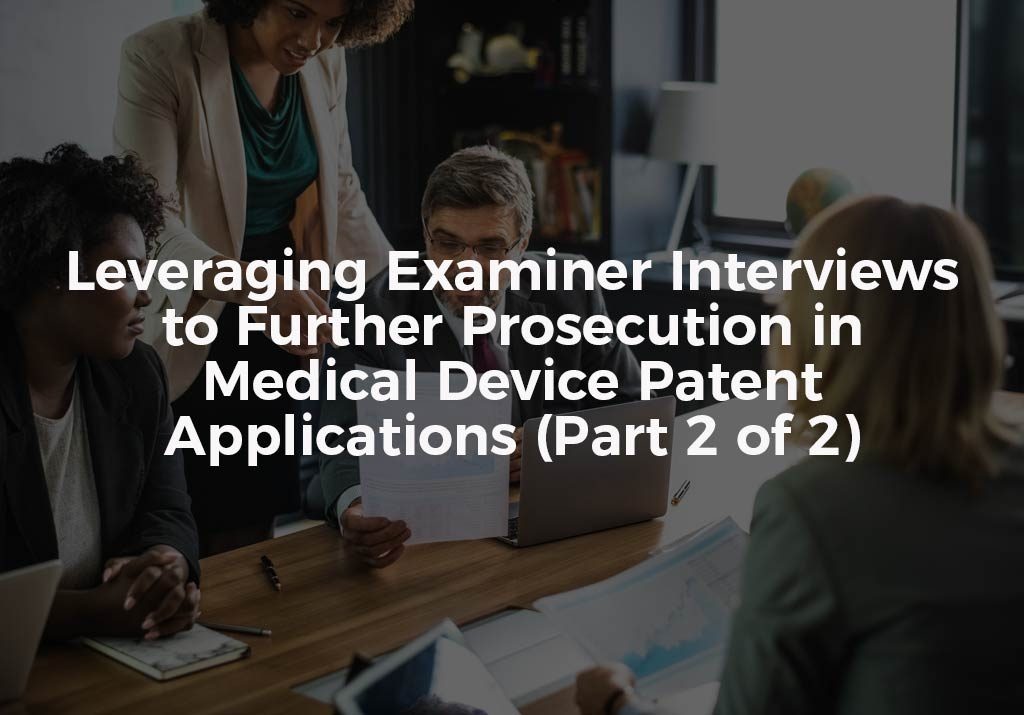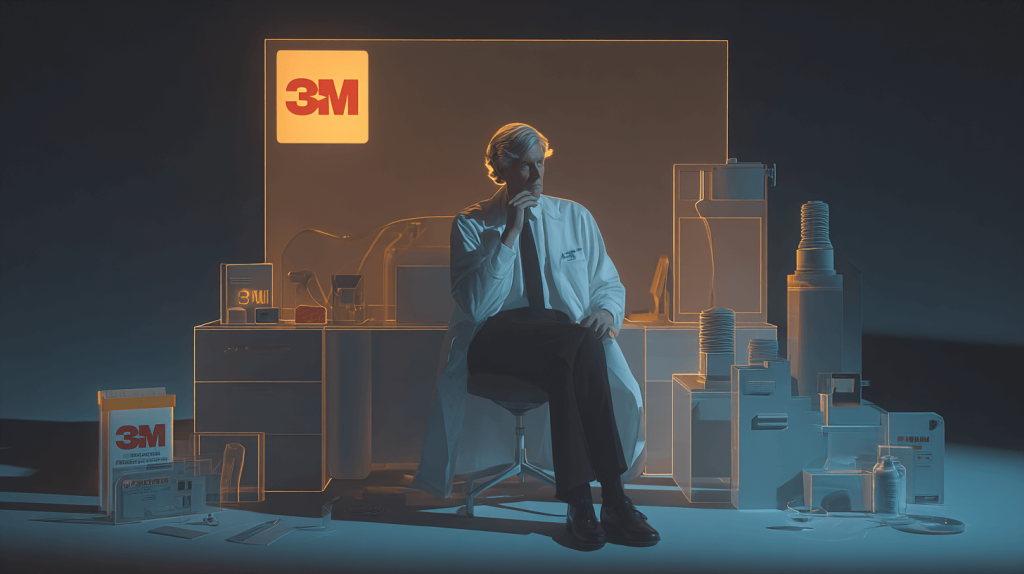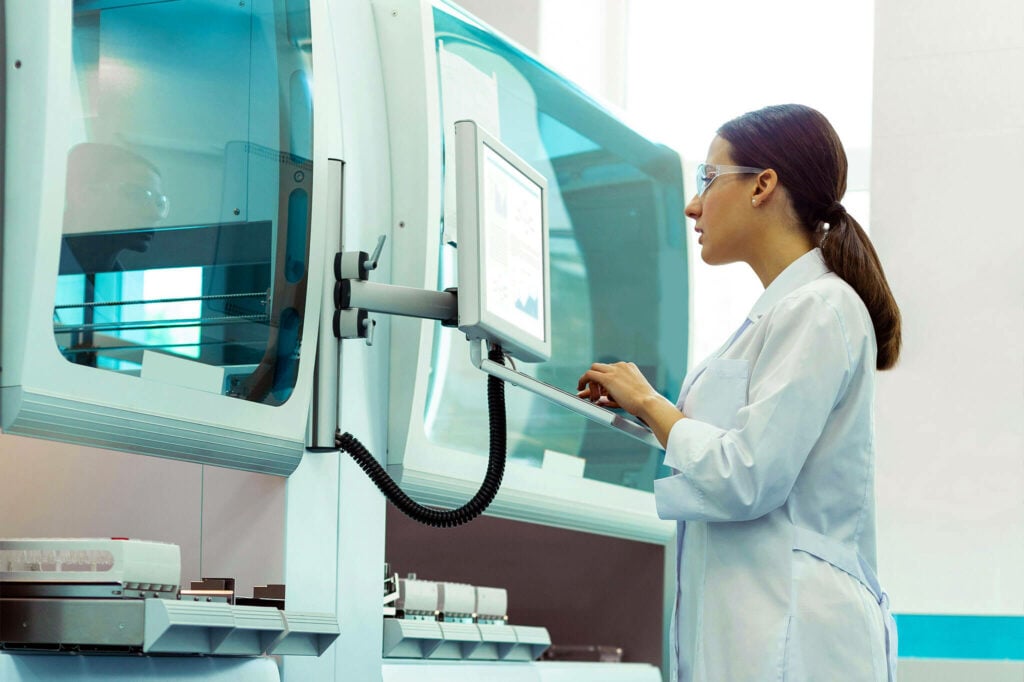An examiner’s interview can be immensely beneficial when working through patent prosecution at the USPTO for your medical device invention. But you are only going to get as much out of the interview as you are prepared to put into the interview. Good preparation for your examiner interview will ensure that you maximize your time with the examiner handling your case.
Send A Detailed Agenda in Advance
The USPTO offers a Best Practices Guide for examiner interviews. In addition to filing form PTOL-413A, which sets forth a general intent/goal and a brief summary of the arguments to be presented to the examiner during the interview, it is considered among the “best practices” to prepare a detailed Interview Agenda. Sometimes the examiner will request that the agenda be sent over in advance when scheduling the interview. While it is recommended that the agenda be sent four weeks in advance of the interview, examiners are often flexible with most only needing the agenda a few days in advance in order to prepare. It is wise to send an agenda even if one is not requested. Faxing is preferred, but in some cases email may also be acceptable.
What Else Should be Sent in Advance of the Interview?
Since one main purpose of an interview is to reach an agreement with the examiner concerning patentability, where applicable, it may be useful to send review copies of:
- Applicant’s proposed Response submission.
- Any and all proposed amendments to the specification, claims and drawings, if any.
- References to be discussed during the interview.
- Additional evidence to be discussed.
- A summary of the arguments to be presented (if not already part of the detailed Agenda).
The foregoing allows the applicant and the examiner to prepare and conduct a well-organized interview. Sending these items in advance also gives the examiner an opportunity to review and consider these items, which will allow for better use of your time during the interview.
Who Should Attend the Interview?
In addition, Form PTOL-413A also asks for a list of “Tentative Attendees.” Guidance on who should attend should be taken from the Office Action. If the only issues are legal and procedural, then maybe only legal counsel needs to attend the interview. By contrast, if the issues are technical, needing the expertise of the inventor and those with the expertise in the technology, then the inventor and technical experts should also attend the interview. It is important to bring the “witnesses” who will best help convince the examiner and overcome grounds for rejection. The Best Practices Guide suggests that the applicant should be prepared to explain during the interview:
- The “inventive concept” of the invention.
- How the inventive concept is captured in the claim(s).
- Any differences between the prior art of record and the claim(s).
- How the claim(s) are distinguished over the prior art.
- “Real world” applications of the claimed invention to assist in enhancing the examiner’s understanding of the claimed invention.
Should You Bring Anything to the Interview?
In the same manner, the attorney should bring any and all evidence — documentary and demonstrative — that will be most helpful in persuading the examiner. In the medical device art, it is typical for applicants to bring a working prototype of the medical device to show the examiner. If the prototype is too large, it is also common to provide the examiner with a video and photos of the device. If practical, a demonstration of the invention is often useful to explain the differences between the invention and the prior art, especially if you are able to bring the prior art device to the interview along with your medical device.
“Witnesses” Should be Thoroughly Prepared for Interviews
Examiner interviews should be treated with as much seriousness as a more formal administrative or legal hearing. Your “witnesses” should be thoroughly prepared and practiced. This has many advantages. First, prepping witnesses helps you become better prepared for the interview. Second, practice preparing witnesses tends to reduce stress on the participants since, once the interview begins and the “witnesses” begin talking, there is familiarity with the process and the participants’ various roles.
In addition, your “witnesses” should be coached so that they understand their purpose — to help reach an agreement with the examiner. As such, they should be practiced to focus on the reasons stated for rejection and how to overcome those reasons. Indeed, the Best Practices Guide cautions that applicants “… should avoid being overly meticulous on minor or trivial details in the application.”
Completing the Interview Examination Summary
Finally, after the interview, both the examiner and the applicant’s attorney must prepare a written Examination Interview Summary. The Interview Summary briefly details what was presented during the interview and documents any agreements that were reached.
Conduct an Examiner Interview with The Rapacke Law Group
If you need more information with respect to the advantages of an examiner interview or would like to discuss how to improve your chances of succeeding on your patent application, contact a trusted and proven attorney at The Rapacke Law Group. We have held countless examiner interviews and we know how to make the most of our time with examiners. Call us at 954-951-0154 or reach us by completing this online contact form.




